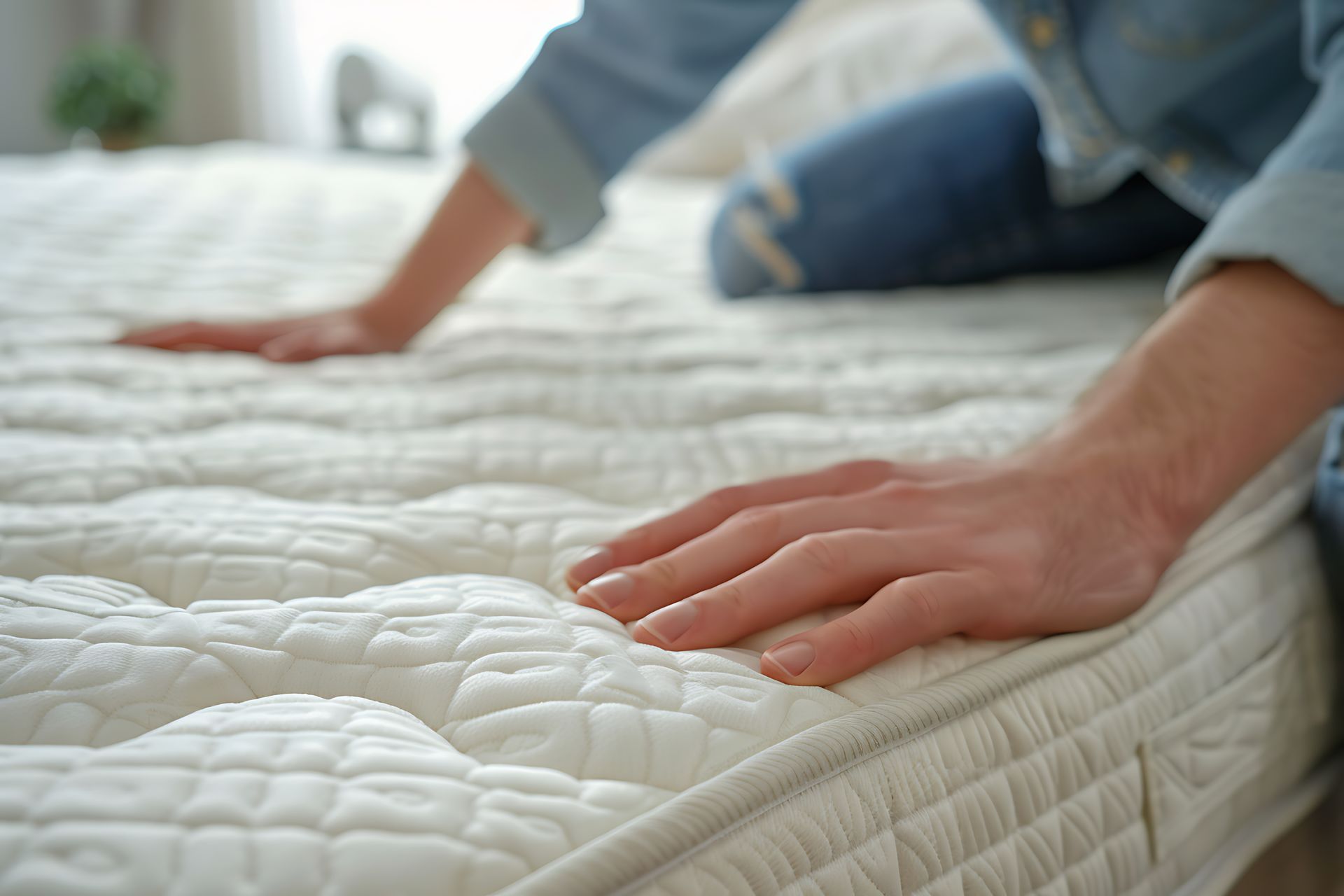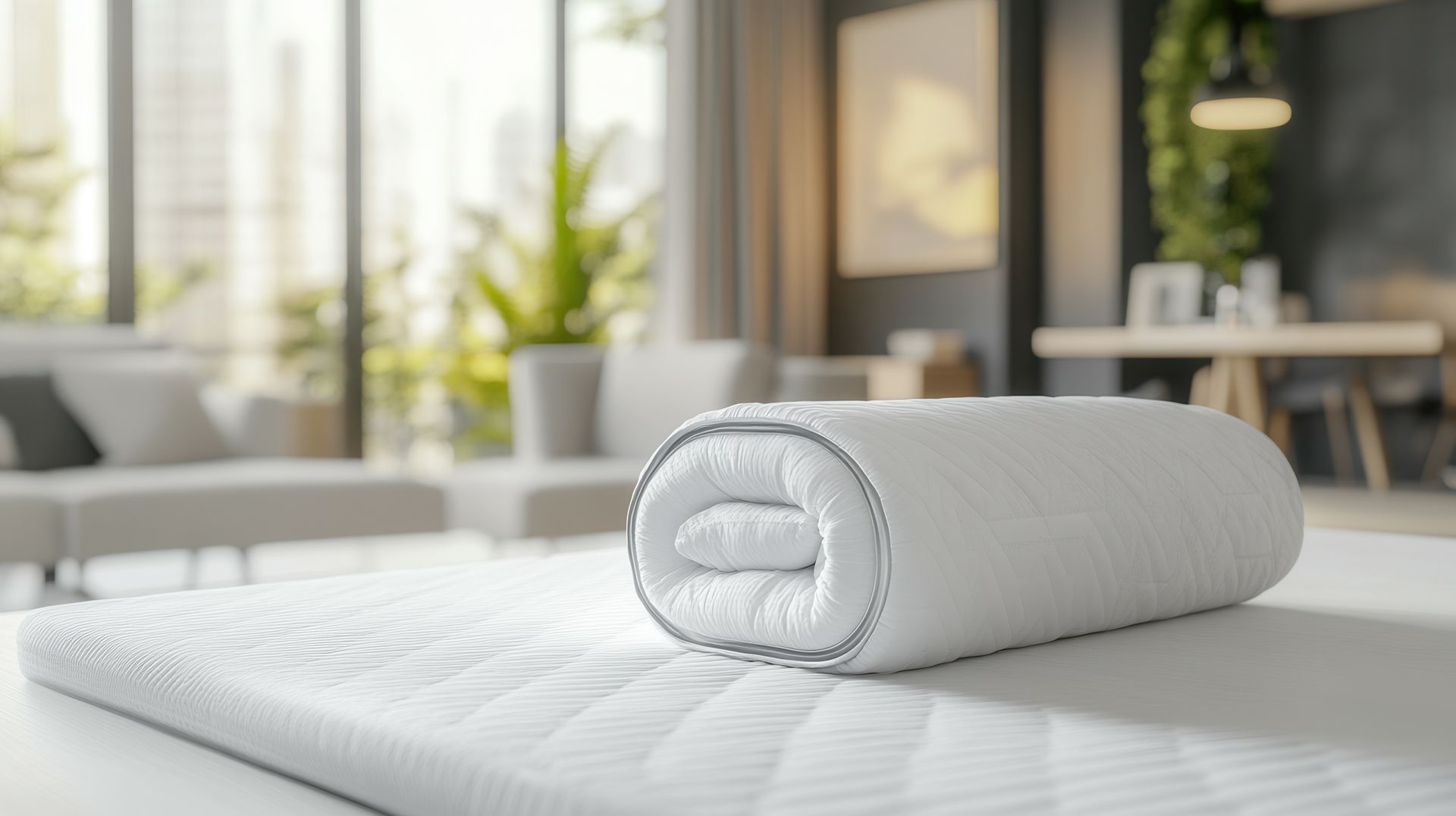Get a KING for the price of a QUEEN and a QUEEN for the price of a FULL! | Shop Now!

temperatures and shorter days can contribute to feeling stiff and sore in the mornings, especially if you’re not adjusting your sleep routine to support better winter wellness.
A few key changes to your sleep position, stretching habits and nighttime routine can make all the difference in preventing those winter morning aches and pains.
Optimize Your Sleep Position
Your sleep position plays a significant role in how you feel when you wake up, particularly when it’s cold outside and your muscles are naturally more prone to tension. During winter, sleeping in positions that promote spinal alignment can be especially helpful for avoiding stiffness and pain.
- Back sleepers: Place a pillow under your knees to keep your spine in a neutral position, which can reduce strain on your lower back.
- Side sleepers: Try putting a pillow between your knees to keep your hips aligned, reducing pressure on your lower back and preventing hip pain.
- Stomach sleepers: This position can put strain on the neck and lower back, which might feel even worse in cold weather. If you must sleep on your stomach, use a thin pillow or none at all, and consider placing a small pillow under your hips to relieve pressure on your spine.
Keep Warm Without Overheating
Waking up with stiff muscles can sometimes be due to the cold affecting circulation as you sleep. Keeping your bedroom at a moderate temperature can help your muscles stay relaxed. Layering your bedding is a good strategy, as it lets you control your warmth without overheating.
- Use breathable layers: Instead of one heavy blanket, try layering lighter blankets or using a comforter over a thinner blanket. This allows you to easily adjust if you start to feel too warm or too cold.
- Wear warm, comfortable pajamas: Warm, breathable pajamas can help keep your muscles relaxed without making you sweat. Look for fabrics like cotton or flannel, which are warm but not stifling.
Stretch Before Bed and After Waking
Stretching is a simple but effective way to keep muscles from feeling tight and sore in the morning, especially when the colder weather causes them to contract. Incorporating a few stretches into your bedtime routine can help your body stay limber through the night.
Here are a few good ones to try:
- Cat-cow stretch: This gentle spinal movement helps relieve back stiffness by increasing circulation to the spine.
- Seated forward bend: This stretch targets the hamstrings and lower back, which can be areas of tension when you wake up.
- Neck and shoulder rolls: Loosening up your neck and shoulders before bed can prevent upper back and neck stiffness.
Taking a few minutes to stretch when you wake up can also help relieve stiffness. A quick morning stretch routine can improve circulation, release any tension built up overnight and help you start your day with less pain.
Invest in a Supportive Mattress and Pillow
A supportive mattress and pillow are essential year-round, but they become even more crucial in winter when joint and muscle discomfort can be exacerbated by the cold. If you find yourself waking up with new aches and pains, it might be time to assess your mattress and pillows.
Look for a mattress that provides a balance of comfort and support. For side sleepers, a softer mattress that conforms to the body might help relieve pressure points, while back sleepers may benefit from a medium-firm mattress that promotes proper alignment.
Choose a pillow that keeps your neck aligned with your spine, reducing the chance of morning neck and shoulder pain. The right pillow can depend on your sleeping position, so make sure to find one suited to how you sleep.
Create a Relaxing Nighttime Routine
Stress can contribute to muscle tension, which often feels worse in the colder months. Establishing a relaxing bedtime routine can help you wind down both physically and mentally, making it easier to sleep deeply and wake up refreshed.
A warm bath or shower before bed can relax your muscles and prepare your body for sleep. The warmth can also help improve circulation, which prevents stiffness.
People coping with busy or stressful lives may also benefit from a few minutes of gentle yoga or deep breathing exercises before bed. This can relieve tension and set a calm tone for the night. The blue light from screens can interfere with your body’s natural sleep-wake cycle. Instead of doomscrolling on social media while you lie in bed, opt for relaxing activities like reading or meditating.
Hydrate Properly
Dehydration is easy to overlook during the colder months, but it can lead to muscle stiffness and discomfort when you wake up. Physiological factors, like reduced sweating and constricted blood vessels, cause people to feel less thirsty when the weather is colder. Making a habit of drinking water during the winter, even if you don’t feel thirsty, is vital for muscle health and your overall wellness.
Keeping your hydration levels up can help keep your muscles loose and prevent cramps that could disrupt your sleep.
Our Mattresses
Our Locations
North Spokane Showroom
12519 N Division St, Suite 4
Spokane, WA 99218
(509) 413-2431
Map & Directions
Business Hours
- Mon - Fri
- -
- Saturday
- -
- Sunday
- Closed






